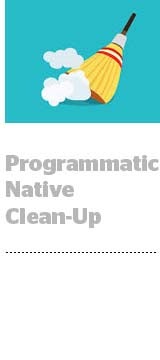Programmatic native is cleaning up its act.
Content recommendation engines like Taboola and Outbrain provide an easy incremental revenue stream for publishers. But their cost-per-click model, which favors performance over quality, enables traffic arbitrage and creates brand safety risks.
To account for those concerns, native exchanges like TripleLift, Connatix, Nativo and Sharethrough have leveraged direct relationships with publishers to create private marketplaces – and are scaling by integrating with demand-side platforms (DSPs).
“Knowing they have that tie-in [to DSPs] makes it easier to execute a buy with them,” said Alex Stone, VP of digital investment at Horizon Media. “Instead of going directly through Nativo [or another programmatic native vendor], we can buy programmatically to get scale and still get the same reporting metrics.”
By owning the entire supply chain, avoiding sourced traffic and inking direct relationships with supply partners, private native exchanges create fewer opportunities for low-quality or fraudulent players to slip into their exchanges, said Tyler Pietz, founder at Two Rock Consulting.
“Limiting the transaction to three primary parties — the publisher, the exchange and the buyer – has much less potential for quality or fraud issues,” he said.
That added element of brand safety is why Xaxis’ native programmatic unit, Plista, has stopped buying from content recommendation engines in favor of private native exchanges, said Elizabeth Harrington, head of Plista in North America.
“If it’s coming through an open exchange, it doesn’t have strict monitoring in place,” she said.
Horizon’s Stone also moved his clients away from content recommendation engines in favor of private native exchanges.
“We wanted more of a relationship between that native partner and the publishers, an added layer of brand safety,” he said. “They are a little more premium to work with and you’re paying a little more to work with them.”
But for publishers, native exchanges aren’t as easy to monetize because they transact on a CPM and are more selective about sourcing supply and demand.
“[Private native exchanges] don’t yield nearly as much revenue for them as their partnerships with Yahoo [Gemini], Taboola and Outbrain, but they’re willing to pay premiums for higher-quality content and a better user experience,” Pietz said.
And the rise of private native exchanges has forced content recommendation engines to think about brand safety.
Taboola has made 90% of its video inventory available on a viewable CPM and blocks about 50% of content that comes through its network, said CEO and founder Adam Singolda.
Revcontent rejects over 90% of publishers who ask to join its marketplace. And Outbrain only buys traffic within its marketplace and lets publishers employ third-party verification solutions to combat fraud.
“They’re starting to realize that there are advertisers their model doesn’t work for,” Pietz said. “Both [Taboola and Outbrain] have started to situate themselves more as flexible programmatic native ad players.”
But most publishers view these content recommendation companies as scale plays, so convincing them to buy into a new narrative that sacrifices an easy buck for quality will be difficult – especially when they already have that need fulfilled through private native exchanges, Stone said.
“Publishers will ask, ‘Why all of a sudden do I not have as much scale with these vendors as I used to have?’” he said.
In-feed native units and content recommendation widgets can coexist on the same page. Despite the quality issues that arise on the latter, most publishers will continue working with both, said Alex White, VP of product marketing at Sharethrough.
“It’s hard to rip out a very lucrative relationship that sits on the page and you don’t have to do anything to make the money,” he said. “Publishers that are sensitive to user engagement are moving away from it. [For] those that weigh the value of that check at the end of the month versus that user experience, it’s somewhat of a mixed bag.”
Despite their push for more quality relationships, publishers will continue to view content recommendation engines for their original value prop: an easy way to drive scale and make a buck.
“They swam to the bottom of the barrel and now they’re trying to swim upstream and be more premium,” Stone said. “But they’ll still do the bottom of the barrel.”














